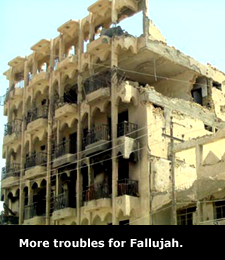Well, what did we learn this week, girls and boys?
We learned that the Afghan war is more pointless and destructive than many of us had given it credit for, thanks to the wikileaks papers. We also learned that the Iraq war is – very much like its predecessor, the Gulf War – leaving a trail of grave illness and lingering death years after the height of our attack. Patrick Cockburn of the Independent of London reports that cancer and infant  mortality rates in Fallujah have reached ridiculously high levels in the wake of the U.S. assault, very likely the result of our use of depleted uranium munitions. The casing materials from these armor-piercing shells caused untold misery in Iraq in the years following the Gulf War, during which time essential medical supplies were being withheld from them by virtue of U.S. /U.K. sanctions. (Cockburn’s colleague Robert Fisk tells the story in his book The Great War for Civilization.)
mortality rates in Fallujah have reached ridiculously high levels in the wake of the U.S. assault, very likely the result of our use of depleted uranium munitions. The casing materials from these armor-piercing shells caused untold misery in Iraq in the years following the Gulf War, during which time essential medical supplies were being withheld from them by virtue of U.S. /U.K. sanctions. (Cockburn’s colleague Robert Fisk tells the story in his book The Great War for Civilization.)
This is a vastly underreported impact of war and its aftermath, at least in this country. During the twelve years of sanctions against Iraq Americans heard very little from their media or their politicians about what was happening to the general population. During the Gulf War, we attacked Iraq’s infrastructure, not sparing its water treatment and distribution facilities. The sanctions that followed that war disallowed the requisite technology to repair that infrastructure. In a country such as Iraq, this is tantamount to biological warfare. Literally hundreds of thousands of people, many of them children, died of preventable water-born diseases because of this, according to the U.N. Madeleine Albright, Secretary of State during much of that time, said the policy was worth the cost. There seems to be a bipartisan consensus there.
As an imperial power, we make these cost-benefit calculations all of the time. Our estimates always seem to devalue the lives of those we invade and occupy, however. It isn’t that life is cheap – it’s more specific than that. Their lives are cheap, not ours. (Though with respect to our military, ours, too.) I’m sure there are many who feel that the human costs of the most recent Iraq war were worth the benefit of removing Saddam Hussein from power. I cannot agree. This war resulted in the deaths of upwards of a million people and generated something like 4 million refugees, 2.5 million of whom landed in squalor in Jordan and Syria. There is no political end that can justify that much suffering, not in Iraq or Afghanistan or any other country we’ve been targeting.
So what did we learn, after all? Not much, it appears. Let’s keep trying.
luv u,
jp
